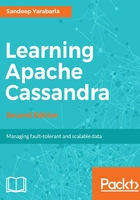
UUIDs
Cassandra has two types that store Universally Unique Identifiers:
- The uuid type stores Version 1 and Version 4 UUIDs
- The timeuuid type stores Version 1 UUIDs and has special functionality for conversion between UUIDs and timestamps
A Universally Unique Identifier (UUID), is essentially a very large number generated in a specific way, designed to guarantee that the same UUID will never be generated anywhere in the world at any time. Version 1 UUIDs are generated using a high-precision timestamp and the generating computer's MAC address; the timestamp can be extracted from the UUID. Version 4 UUIDs use random or pseudo-random numbers.
CQL uses the canonical representation of UUIDs, which is a sequence of hexadecimal digits broken up in specific places by dashes, in the form 8-4-4-4-12. A CQL UUID literal is not surrounded by quotation marks or any other delimiter; for example, 550e8400-e29b-41d4-a716-446655440000 is a valid UUID literal. Most languages have UUID libraries available that will generate UUIDs and output them in the canonical format.